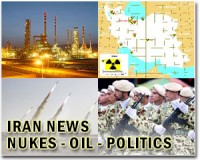| . |  |
. |
Washington (AFP) Feb 17, 2011 US intelligence agencies believe Iran's leaders are locked in debate about whether to build nuclear weapons and that sanctions have aggravated those divisions, a US official said Thursday. The spy services' assessment features in a new classified national intelligence estimate (NIE) on Iran, the official told AFP, confirming a Wall Street Journal report. "The current thinking of the US intelligence community that there is in fact a serious debate inside the Iranian regime whether to continue or not with a nuclear weapons program," said the official, who spoke on condition of anonymity. "Our sense is they haven't reached a conclusion yet." Echoing comments made previously by Defense Secretary Robert Gates and other US officials, the intelligence agencies believe tighter sanctions on Iran are squeezing the country's economy and fueling an apparent rift among the leadership over the nuclear project, the official said. "There is a strong feeling that sanctions are having an impact on stepping up the pressure on the government" and having an effect "on broader national security policy questions that the Iranians have to deal with." In November, Gates said there were signs that the sanctions had hit Iran hard and created tensions between the country's supreme leader, Ayatollah Ali Khamenei, and the president, Mahmoud Ahmadinejad. "We even have some evidence that Khamenei now is beginning to wonder if Ahmadinejad is lying to him about the impact of the sanctions on the economy," Gates said. The intelligence estimate marks a shift from a disputed assessment in 2007, which concluded the nuclear weapons program was suspended in 2003, a view that some US policy makers and European spy agencies rejected. The new estimate reportedly says Tehran probably has revived atomic weapons research and increased its uranium enrichment work. "They may be conducting limited research and development work in the event they make the decision to go forward," the US official said. The official added: "There's no indication at this point that the Iranians are moving full steam ahead towards a nuclear weapon...they are keeping their options open." National intelligence estimates are supposed to represent a consensus of the full array of American spy agencies and as a result tend to carry more weight. The director of national intelligence, James Clapper, told lawmakers at a hearing on Wednesday that the sanctions were squeezing Iran's economy but it was unclear if it would persuade Tehran to abandon its nuclear ambitions. "As the screws have gotten tighter, I think they clearly are seeing the effect. I can't say, frankly, that that has had effect on their nuclear program at this point," Clapper said. The latest intelligence estimate was being shared with members of congressional committees this week, he added. Iran has suffered serious delays and equipment breakdowns over the past year at its major uranium enrichment plant, and experts say the problems were likely caused by a computer worm, known as Stuxnet. IT analysts have speculated that Stuxnet was produced by Israel or the United States but both governments have not officially confirmed any role. Western powers led by the United States suspect Iran is masking a weapons drive under the guise of a civilian atomic program, a charge strongly denied by Iran. Iran is currently under four sets of UN sanctions and other unilateral punitive measures imposed by several countries, including the United States and European Union.
Share This Article With Planet Earth
Related Links Learn about nuclear weapons doctrine and defense at SpaceWar.com Learn about missile defense at SpaceWar.com All about missiles at SpaceWar.com Learn about the Superpowers of the 21st Century at SpaceWar.com
 US lawmakers proposes tougher Iran sanctions
US lawmakers proposes tougher Iran sanctionsWashington (AFP) Feb 16, 2011 A group of US lawmakers Wednesday unveiled legislation to toughen sanctions on Iran for its nuclear energy program, calling for international companies traded on US exchanges to reveal investments in the Islamic Republic. "If we can bring greater transparency to any investment being made in Iran, we can defund the nuclear militarization of one of the world's most hostile nations," said Senat ... read more |
|
| The content herein, unless otherwise known to be public domain, are Copyright 1995-2010 - SpaceDaily. AFP and UPI Wire Stories are copyright Agence France-Presse and United Press International. ESA Portal Reports are copyright European Space Agency. All NASA sourced material is public domain. Additional copyrights may apply in whole or part to other bona fide parties. Advertising does not imply endorsement,agreement or approval of any opinions, statements or information provided by SpaceDaily on any Web page published or hosted by SpaceDaily. Privacy Statement |